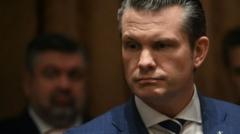Defense Secretary Pete Hegseth's order to pause US cyber operations against Russia raises concerns over American response to ongoing cyber threats, coinciding with President Trump's push for diplomacy.**
US Cyber Offensive Against Russia Paused Amid Diplomatic Efforts**

US Cyber Offensive Against Russia Paused Amid Diplomatic Efforts**
New directive from Defense Secretary Hegseth halts cyber operations against Russia as Trump seeks to negotiate peace in Ukraine.**
In a surprising turn of events, the US has paused its offensive cyber operations aimed at countering Russia, according to officials familiar with the matter. This directive, issued by Defense Secretary Pete Hegseth, comes amid heightened diplomatic efforts to reach a resolution to the protracted conflict in Ukraine, which has been ongoing for over three years since Russia's full-scale invasion.
The reasoning behind the pause remains unspecified, creating uncertainty about its duration and repercussions for American cyber defense strategies. The Department of Defense has opted not to offer any comments on the instruction, which is seen as part of a shift in tactics under President Donald Trump's administration. Since reclaiming the presidency, Trump has visibly adopted a more conciliatory stance towards Russia, prioritizing negotiations over confrontational rhetoric. His remarks during a recent televised exchange with Ukrainian President Volodymyr Zelensky further underscored this shift, as Trump expressed a willingness to engage with President Vladimir Putin in peace talks.
The implications of Hegseth's directive are significant, potentially affecting the operational readiness of hundreds, if not thousands, of personnel working within US Cyber Command. This could also hinder efforts to bolster cybersecurity defenses for Ukraine, an essential aspect of the conflict against Russian interference, including hacking and disinformation campaigns targeted at Western allies.
National Security Adviser Mike Waltz has publicly stated that there has been no policy shift, despite recognizing the necessity of varied strategies—both rewards and consequences—to expedite the end of the conflict. Meanwhile, Trump's team has faced scrutiny from critics, including Senate Minority Leader Chuck Schumer, who labeled the pause as "a critical strategic mistake." Schumer warned that this action essentially grants Russia leeway as it continues aggressive cyber operations against US infrastructure.
The paused cyber operations coincide with ongoing discussions among senior members of Trump's administration, who recently convened with Russian officials in Saudi Arabia, leaving Ukrainian representatives out of the dialogue. Secretary of State Marco Rubio defended the administration's approach, suggesting that a tone of hostility would counteract peace negotiations.
As the situation evolves, the international community anxiously awaits the ramifications of this strategic pause and its impact on the broader geopolitical landscape, particularly in relation to cybersecurity and diplomatic relations with Russia.
The reasoning behind the pause remains unspecified, creating uncertainty about its duration and repercussions for American cyber defense strategies. The Department of Defense has opted not to offer any comments on the instruction, which is seen as part of a shift in tactics under President Donald Trump's administration. Since reclaiming the presidency, Trump has visibly adopted a more conciliatory stance towards Russia, prioritizing negotiations over confrontational rhetoric. His remarks during a recent televised exchange with Ukrainian President Volodymyr Zelensky further underscored this shift, as Trump expressed a willingness to engage with President Vladimir Putin in peace talks.
The implications of Hegseth's directive are significant, potentially affecting the operational readiness of hundreds, if not thousands, of personnel working within US Cyber Command. This could also hinder efforts to bolster cybersecurity defenses for Ukraine, an essential aspect of the conflict against Russian interference, including hacking and disinformation campaigns targeted at Western allies.
National Security Adviser Mike Waltz has publicly stated that there has been no policy shift, despite recognizing the necessity of varied strategies—both rewards and consequences—to expedite the end of the conflict. Meanwhile, Trump's team has faced scrutiny from critics, including Senate Minority Leader Chuck Schumer, who labeled the pause as "a critical strategic mistake." Schumer warned that this action essentially grants Russia leeway as it continues aggressive cyber operations against US infrastructure.
The paused cyber operations coincide with ongoing discussions among senior members of Trump's administration, who recently convened with Russian officials in Saudi Arabia, leaving Ukrainian representatives out of the dialogue. Secretary of State Marco Rubio defended the administration's approach, suggesting that a tone of hostility would counteract peace negotiations.
As the situation evolves, the international community anxiously awaits the ramifications of this strategic pause and its impact on the broader geopolitical landscape, particularly in relation to cybersecurity and diplomatic relations with Russia.






















